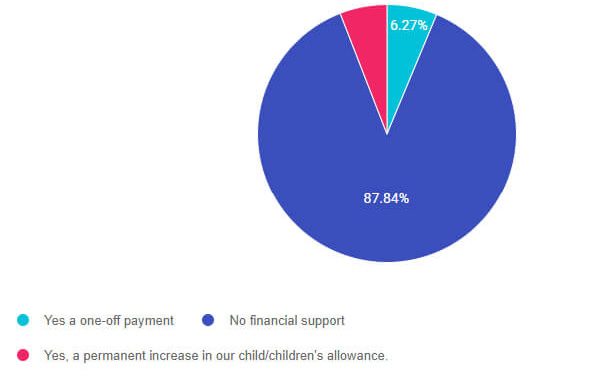
Over half (54%) of foster carers are considering resigning because of the cost of living crisis, a survey of over 1,000 has found.
Information and advice service FosterWiki revealed that, of 1036 respondents to its survey, most (89%) had resorted to cutting back on essentials including food, heating, fuel and everyday activities with children.
A majority (88%) had also received no financial aid from local authorities or independent fostering agencies (IFAs) to battle the rising costs, with 2.5% turning to food banks for help.
With fuel prices soaring, just 6% said they had their mileage costs covered, while for 71% rates did not cover their costs and almost a quarter (23%) got no mileage allowance at all.
The findings come amid significant challenges in recruiting and retaining foster cares, with a 2021 analysis by think-tank the Social Market Foundation predicting a shortage of 25,000 carers in England by 2026.
The Independent Review of Children’s Social Care also raised similar concerns in its final report in May, recommending a drive to recruit 9,000 foster carers in England over the next three years.
‘No one will contemplate fostering’
FosterWiki founder Sarah Anderson said the survey results showed that the fostering community was “struggling for its very existence”.
“No one will contemplate taking on a role in our current socio-economic climate that leaves them in such a vulnerable financial position and an inability to provide for the very children they wanted to care for,” she said.
“Children are already bounced around the system with multiple placements re-traumatising them, creating long-lasting mental health issues and affecting their future outcomes, which are already dire.”

Percentage of foster carers that have received financial help with the cost of living. Photo: FosterWiki
Allowance rise fails to cover mounting costs
In April, the Department for Education increased the minimum fostering allowances that English councils and agencies should pay carers, by between £3 and £5 a week, depending on the location and age of the child.
However, as of March 2022, the average family’s cost of living has risen by about £400 per month, according to a recent analysis by the Joseph Rowntree Foundation and Loughborough University.
Additionally, the FosterWiki survey found only 5% of providers had passed on the government increase to their carers.
For 40% of respondents, the financial strain was further exacerbated by them having no other source of income.
“I’m terrified the kids are going to be taken away”
Louise, who cares for two foster children alongside her own two children, has had to rely on her husband’s job and dip into savings to make ends meet.
With a total weekly allowance and fee of £300 per child, she is part of the 59% of carers that reported their payments did not meet the full costs of fostering.
“The allowance, what they give us, wasn’t enough 10 years ago and it hasn’t changed since then,” said Louise. “If I’m honest with you, we almost pay to be foster carers.
“What if my husband loses his job? I need to work but I can’t because I need to look after the children. I’m terrified the kids are going to be taken away. They’re very happy here, they’re part of our family – but if we can’t afford to eat, where will they go?
“They’ll be bouncing from home to home in a system that is inadequate.”
Having stopped teaching 10 years ago to meet the requirements of becoming a foster parent, and with almost no savings left to get through the upcoming winter, Louise has resorted to sewing and mending clothes and curtains to bolster her income.
In the past three weeks she has also seen six fellow carers quit because they could no longer afford to choose between eating and fostering.
“I know foster carers who are using food banks,” she added. “The weird twist is we’re absolutely terrified revealing this to our social workers or the local authorities because, if we can’t afford to keep our children, even though we pay for them, we’re worried they will be taken away.”
On the back of the survey, FosterWiki called on the UK government and the Scottish, Welsh and Northern Irish administrations to make one-off payments to foster carers immediately, and then again in November and February 2023, to ease pressures.
“This is essential to stabilise placements, to ensure children’s needs are met, their standards maintained and they remain in secure loving families,” it said.
Responding to the findings, Edwina Grant, chair of the Association of Directors of Children’s Services’ (ADCS) health, care & additional needs policy committee, called the findings “concerning” as “our need for more foster carers is greater than ever”.
She said councils in England were investing in local and regional fostering recruitment campaigns but were hampered by inadequate funding.
She urged the government “to review the situation and then step in quickly to provide any practical solutions required”, and backed the care review’s call for a national recruitment campaign.
“It should focus on the value of foster carers and the good that they do, so we can ensure the right foster home is available at the right time, for every child,” Grant added.
Government ‘must not rely on goodwill’
Harvey Gallagher, chief executive of IFA representative body the Nationwide Association of Fostering Providers, also said that only central government can address this issue, and that it should not be “relying on the goodwill of foster carers” to keep the system going.
While the care review called for better support for foster carers, it did not reference increasing financial support.
Gallagher said was disappointing because, in the context of carer shortages, “
He also urged the UK government to review foster carers’ tax status, which he said was long overdue.
Currently, carers do not pay any tax on the first £10,000 they earn from fostering plus a weekly allowance worth £200 for each child they foster aged under 11 and £250 for older children. However, these rates have remained unchanged since 2003.
“I think that will be an easy win for government, I really don’t understand why they haven’t done it,” he said, adding the sector would need to lobby hard for its inclusion in the government’s response to the care review, due later this year.
In response to the FosterWiki survey, a Department for Education spokesperson said: “We are clear that no foster carer should be out of pocket because of their fostering role”.
“It is the responsibility of fostering service providers to set their own payment structures in accordance with local needs, using the national minimum allowance,” they added, also highlighting the existing tax and benefit arrangements for carers.




 Bournemouth, Christchurch and Poole
Bournemouth, Christchurch and Poole  Hampshire County Council
Hampshire County Council  Lincolnshire County Council
Lincolnshire County Council  Norfolk County Council
Norfolk County Council  Northamptonshire Children’s Trust
Northamptonshire Children’s Trust  South Gloucestershire Council
South Gloucestershire Council  Wiltshire Council
Wiltshire Council  Wokingham Borough Council
Wokingham Borough Council  Children and young people with SEND are ‘valued and prioritised’ in Wiltshire, find inspectors
Children and young people with SEND are ‘valued and prioritised’ in Wiltshire, find inspectors  How specialist refugee teams benefit young people and social workers
How specialist refugee teams benefit young people and social workers  Podcast: returning to social work after becoming a first-time parent
Podcast: returning to social work after becoming a first-time parent  Podcast: would you work for an inadequate-rated service?
Podcast: would you work for an inadequate-rated service?  Family help: one local authority’s experience of the model
Family help: one local authority’s experience of the model  Workforce Insights – showcasing a selection of the sector’s top recruiters
Workforce Insights – showcasing a selection of the sector’s top recruiters 

 Facebook
Facebook X
X LinkedIn
LinkedIn Instagram
Instagram
I really encourage foster carers to join the trade union https://fosteriwgb.co.uk/
Don’t despair or just get angry, organise. Foster carers deserve to have their voices heard. Too often Local Authorities make changes without even a cursory glance to the views and thoughts of foster carers.
As with social workers, the goodwill is too often taken advantage of.
It becomes more important each day for foster carers to join the National union of professional foster carers, the only union for foster carers in the UK formed by order of the High Court and approved by government and which is the only union in the UK where members of the union become workers and can get certain workers rights.
Individually foster carers will achieve very little but the NUPFC are already working with the government to make changes!
Join today and make a difference – http://www.NUPFC.com
If carers join a trade Union and are fighting classed as employees it’s will be the end of foster care. The Glasgow example is a one off. The LA’s and IFA’s won’t have the money to pay carers. LA’s won’t have the increase and IFA’s won’t take the money off their bottom line. In reality IFA’s get at most ( £780 a week) for the care of children which is a lot and 20% is skimmed off. Carers are best placed having the conversation with their IFA and LA. They will NOT want to lose you. For the IFA you are licence to print money. For the LA they don’t want you to go to an IFA for them to pay IFA rates. Militant action or being a pain to LA’s or IFA’s will get you nowhere. Unfortunately there are a new batch of people after the pandemic willing to work for less, at home, even if the wages don’t stack up. Might not seem ethical but it’s the reality. Ask your IFA or LA to do a deal with you for new wages and ask to sign a NDA. Reason being? They won’t wish you to speak to other carers but Individual deals are done all the time. But if carers have done little training, are bolshie, don’t do diaries or attend meetings then all providers won’t stump up extra dosh.
From the last comment it is clear government is washing their hands of the serious state we find ourselves in. It seems that its alright to come away with no financial gain as long as we don’t loose money. I’m sorry but I didn’t realise I was signing up as a charity when I became a Foster carer. Norfolk County Council dropped our money by £100 pound a week this year for a single under five just as my fuel bills have gone frome £1000 to £3000. We had no rights to stop them.
Many are leaving, I would if I didn’t adore my two long term placements.
To say I am disgusted is an understatement.
It’s a very simple equation no foster carers equals no foster care. The government needs to act and act quickly to stop the mass exodus of experienced carers. We all know how long it takes to qualify a potential carer, any short cuts to rush through carers would not benefit either the child or the carer.
Maybe it’s time to take matters into your on hands and call for an emergency review of arrangements to take into account the crisis.
More shocking is that a a recent carers forum organised by the agency we are associated with the cost of living crisis was not even on the agenda for discussion.Taking matters into your own hands as an individual seems the only solution.It’s high risk as it could backfire but that is what they are banking on .(emotional blackmail )We have had one small increase in rates in over 10 years .Incorrectly categorised as Public sector pay freeze employee s without the security fringe benefits. The increase was so insignificant you are expected to be content with what is given without any negotiation or consultation.Don’t take it .
This week my property was attempted to be levied by a high court sheriff for a debt a previous adult foster child had occurred through an unpaid train ticket .The amount of goods needed to clear the debt in in the region of £20.000 .Nothing surprises me anymore how insignificant we are treated
I am actually better off financially as a result of fostering, even though I give my teenage foster child a generous allowance and she eats twice as much as I do. Of course, it would be different if I had given up work to foster, as the allowance goes nowhere near to compensating for loss of earnings, but it more than covers the expenses I incur. If I gave up fostering it would be for other reasons like lack of energy (I am in my mid sixties) or lack of support, but not for financial reasons.
I think being a foster carer years ago was something to be proud of and people in your community thought good of you. However now a days it stands for nothing as people just do not care. I see lots of fostering recruitment posts and they are all emphasising £28K tax free allowance as if its something fantastic. it works out at £3.20 per hour for having a child in your care 24/7. In any other profession would you be able to only pay that miserable amount? What happened to the minimum wage? No wonder why recruitment is at an all time low. A big pay rise is needed now
As a social worker it is becoming increasingly worrying that we have to factor in the pressure on services when assessing threshold to issue proceedings. I have a case of 5 children currently in tenuous circumstances with the parent with mental health problems. I know we do not have places in my local authority that would be able to take all of them together, or permit them to remain in school because they are likely to be miles away. When we are able to place a child, the gratitude I feel toward that carer is immense. I really hope that things change, because at this rate there will neither be foster carers nor social workers to ensure the most vulnerable children are safeguarded. Don’t get me started on IFA syphoning money for private gain from the system and imagine if all the money spent on fraudulent track and trace and PPE had been directed toward children’s services?